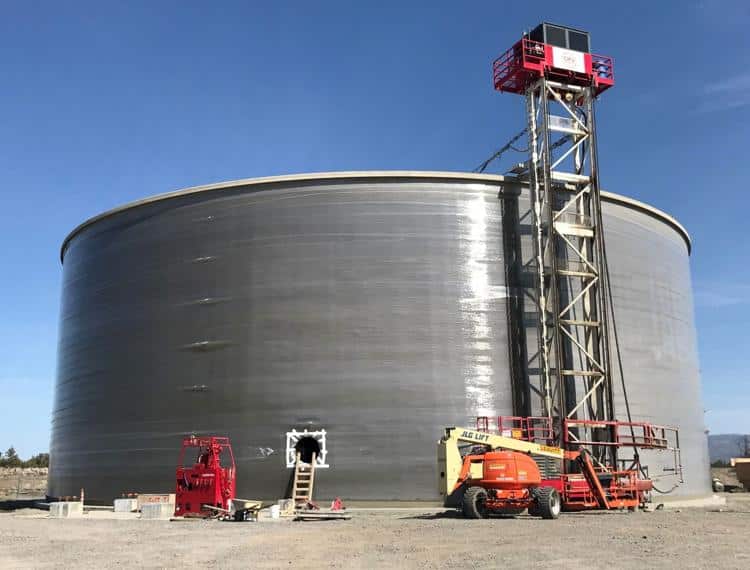This article was published on: 10/19/23 1:04 PM
The state, which has proposed new rules to Oregon’s groundwater permitting process, has signaled that the city of Redmond’s application for a future groundwater permit, would likely be denied.
The Oregon Water Resources Department is reviewing the city’s application, and taking a second look at the statewide rule changes, after feedback from a water commission meeting last month.
Mayor Ed Fitch said Redmond has plenty of water for the time being and that staff are working to secure abundant reserves for future growth. But if the city is unable to do that, and Redmond continues its rapid population growth, Fitch said that lack of water could pose an existential threat in upcoming decades.
“If we were to go with the rule that was proposed, the city would basically be shut off from water. Period,” Fitch, said to the commission. “Not only Redmond, but Bend, Madras, Prineville, La Pine, all of them. There would be no water available in the Deschutes Basin for cities if this rule was implemented the way it is.”
In the past, the state readily approved permits without solid evidence of the sustainability of water, despite statutory requirements to do so. The new rules bring state practices more in line with longstanding law, requiring municipalities to acquire data on groundwater sustainability in order to qualify for a permit.
Advocates for the government’s new approach to Oregon’s water resources say the move is critical as years of drought and pumping have lowered aquifers and endangered rivers.
Redmond gets its city water from the Deschutes Basin aquifer, a large and fast-regenerating underground source replenished by snowpacks from the Cascades. Yet the aquifer, which can be hundreds of feet deep, has since the 1970s declined in places by as much as 37 feet, or roughly a quarter of its volume.
Fast growing cities in Central Oregon, like Redmond, are confident they can work with the state to get the water they need, and are willing to ramp up already stringent conservation measures. However, the concern is that if a compromise isn’t made, cities could find themselves in the untenable position of not having access to water as the state pushes for tens of thousands of more homes across Oregon.
As of Oct. 10, Redmond’s permit — which it submitted in December — is still under review, said Katie Ratcliffe, the Oregon Water Resources Department’s water rights manager. The department could not comment further on the review process or on the details of the rule changes, but said the agency is giving it a second look.
“Given the feedback that we heard from both the public and our commissioners at the latest commission meeting, we are taking another look at our proposed rule changes,” said Alyssa Rash, public information and resiliency specialist for the water resources department.
Fitch told the Spokesman that Redmond is in an advantageous position when it comes to access to water resources, but working things out with the state is imperative to the city’s future.
“We have enough water rights that we acquired over the last 20 years to meet a population of 75,000 people. So, we are in the best position of any city in Central Oregon under the current law,” Fitch said. “But I do think going forward there does need to be some tweaking to the rules because of the drought and because of the drop in aquifers throughout the state. But, they have to have water for cities, which is just the bottom line.”
Neil Brandt, the executive director of WaterWatch, a Portland-based nonprofit dedicated to protecting and restoring Oregon’s rivers, said the state’s new stance on water resources is a sign it is getting more in tune with the law.
“The state has been charged under the statute of the 1955 Groundwater Act to manage groundwater sustainably. For many years the state was basically handing out blank checks for groundwater, meaning giving permits out to tap groundwater where we didn’t even know if there was water available,” Brandt said.
Brandt said his organization works closely to follow permitting decisions made by the state’s water resources department and intervenes on decisions it believes are ecologically damaging or inappropriate.
He said the organization would like to see a more science-based and methodical approach to how groundwater is allocated, measured and reported. He said that often, as cities grow denser, conservation and efficiency measures can significantly offset increased demand from new water users.
“I think that one piece of this is challenging the idea that water use and water demands by cities is going to infinitely grow. I don’t think that is the case,” Brandt said. “I think our message is that the state has been charged under statute to manage groundwater sustainably for 70 years (and) they haven’t been. And these new rules are the state bringing their practice of management into alignment with what the law is. And we are happy to see that.”
In a Sept. 12 city council meeting, Josh Wedding, water division manager for the city of Redmond, said he was confident the permit would get worked out. He noted that staff members can do what they can to increase efficiency and do more with less. But eventually, more people will need more water.
“Even if all things were denied, we still have tools in our tool chest,” said Wedding. “We can design infrastructure in a different way to make do. It’s a little bit more difficult and costs a lot more money and we can only do that for a certain period of time. Eventually we do need a new water right.”




